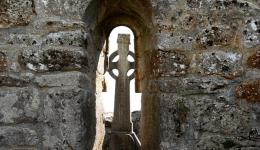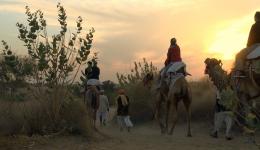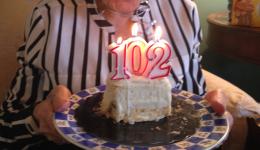Category:
In an article in the Toronto Star, Irish author Colm Toibin was interviewed about his new novel, “Nora Roberts.” I was struck by a comment by the author about one of the book's final scenes in which Nora believes she sees her deceased husband, Maurice. And that of course would be to see a ghost. Says the interviewer, “Ghosts may be part of the Irish pastiche, a cliché almost, but, the Irish writer says, “The novel has been free of them. The 20th century novel has been a hard, secular space.” To which the interviewer replies, “You’re breaking glass here.”
Indeed! - breaking glass here . . .
That statement gives me pause: — “The 20th century novel has been a hard, secular space.” What the author does, it seems to me, is what the Irish have done for many centuries: remind us that there is another world, unseen, super–natural (not anti-natural). Is it any more difficult to believe that there are angels — at least that there were in biblical time, than it is to believe in ghosts? Not only was the 20th Century novel starved for something more – something beyond, but the whole world continues to be starved, hard, secular space.
We have lost the wonder, the mystery, in our enlightened, rational age, and many still feel estranged from some greater Real that once was known. We have figured it all out, or we think we're in the process of doing so. Surely we will eventually. Yet, into the secularism-created vacuum creeps continuing desire for the ‘more’ as evidenced by the surplus of TV programs exploring unnatural wonders, ghosts, the paranormal and the hauntings of people and places. We do not remember saints on November 1st: All Saints Day; yet we retain the over-the-top trappings and bloody goblins of Hallowed-E’en.
This is not to set religion against science (things that are unseen with things that are seen), for both seek to to examine different facets of a greater whole and respond accordingly, with awareness and intent - or not. There are things that science can tell us and things it cannot. Scientists may uncover facts but they cannot give us meaning. What the scientists do not know, the poets may – and try to show and tell, and artists, and mystics too, to which also pastors and priests are continually to give effort, for there are many still who long to believe in another, greater eternal world, that eternally exists and which permeates this-here world of sight, taste and smell.
Secular space is the space in which we all live but it is not the only space in which we breathe (and move and live and have our being). It would be tragic if this world of hard fact and secular space is all there is. What if, in addition to secular space, there remains the realms of the sacred, regions of the heart and of the spirit? That are real too. To believe so does not soften or weaken our world nor life in it; rather, it expands and enhances it enormously.
Are there ghosts? I’m not yet sure, prefering to take on faith the (more-Biblically-attested-to) facts of angels and other wonders from God’s hand, as discovered both by science in Creation (the latter being a great revelation) and through the believers’ approbation of Scripture (the latter being an even greater Revelation).
There is another world that has long been with us and which is still aborning, and we may yet be members of it, discovering the sacred wonder that marbles the meat and sinew of our world, and of our lives.









